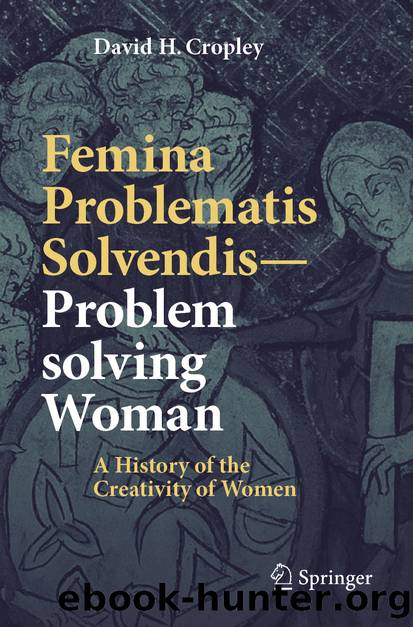Femina Problematis Solvendis—Problem solving Woman by David H. Cropley

Author:David H. Cropley
Language: eng
Format: epub
ISBN: 9789811539671
Publisher: Springer Singapore
7.3.1 What Was Invented?
Sybilla Righton Masters lived in colonial New Jersey, her family having moved there from Bermuda in 1687 when she was still a child. At this stage of history, the European settlement of the New World was still in its early days. Jamestown, Virginia, established in 1607, though not the first European settlement, gives us a sense of the development of the colonies at the time of her arrival. This was still a society and an economy largely based around low levels of technology: small-scale, labour-intensive farms, fur-trapping and trading, fishing, forestry, and so on. The unsavoury and immoral use of slave labour, well-established by the late seventeenth century, only reinforced the low-tech nature of the economy.
Changes, however, were afoot. The first stirrings of the Industrial Revolution in Europe (which is regarded as beginning in around 1760) were emerging with the development, in 1696, of a steam pump by Englishman Thomas Savery (see Homo Problematis Solvendis for a description). Water, used in simple ways for centuries (water wheels, for example, moved water for crop irrigation, or to grind grain), was available as a source of power. What began to change in this era, however, was the way that these sources of power were utilised. Sybilla Righton Masters’ invention was an early example of greater levels of sophistication applied first to water power and later to steam power.
Masters invented a new method for processing cornmeal. Prior to her invention, maize (corn) was dried and ground into a powder to make cornmeal. The traditional millstone grinding method used a stationary, circular, and horizontal bed stone, and a moving runner stone positioned on top of this, with grain or maize fed into this arrangement through an eye in the centre of the runner stone. The runner stone could be turned by a person, an animal, or by water or wind-power. If ground to a sufficiently fine level, cornmeal is sometimes referred to as corn flour, though even in this fine state, it is typically coarser than wheat flour. The resulting cornmeal was a staple food, used for making corn bread, batter, and in colonial times, a type of porridge known as samp.
Masters’ invention set out to achieve a similar outcome—the production of cornmeal—but through a rather different approach. Instead of the circular grinding action of millstones, her method, also water-powered like many mills, used a cylinder rather like a crankshaft10 (or camshaft) to move heavy pestles up and down into mortars containing maize (Fig. 7.3). In this way, Sybilla Righton Masters’ corn mill pounded the maize into cornflour, rather than grinding it. The resulting corn flour became known as Tuscarora Rice, and was a rather coarse-grained flour, used for what is now commonly known as grits (a kind of porridge).
Fig. 7.3Corn Mill Patent, 1715
Download
This site does not store any files on its server. We only index and link to content provided by other sites. Please contact the content providers to delete copyright contents if any and email us, we'll remove relevant links or contents immediately.
Hit Refresh by Satya Nadella(9137)
The Compound Effect by Darren Hardy(8968)
Change Your Questions, Change Your Life by Marilee Adams(7783)
Nudge - Improving Decisions about Health, Wealth, and Happiness by Thaler Sunstein(7707)
The Black Swan by Nassim Nicholas Taleb(7129)
Deep Work by Cal Newport(7085)
Rich Dad Poor Dad by Robert T. Kiyosaki(6633)
Daring Greatly by Brene Brown(6514)
Principles: Life and Work by Ray Dalio(6449)
Playing to Win_ How Strategy Really Works by A.G. Lafley & Roger L. Martin(6308)
Man-made Catastrophes and Risk Information Concealment by Dmitry Chernov & Didier Sornette(6019)
Big Magic: Creative Living Beyond Fear by Elizabeth Gilbert(5773)
Digital Minimalism by Cal Newport;(5765)
The Myth of the Strong Leader by Archie Brown(5508)
The Slight Edge by Jeff Olson(5418)
Discipline Equals Freedom by Jocko Willink(5390)
The Motivation Myth by Jeff Haden(5213)
The Laws of Human Nature by Robert Greene(5208)
Stone's Rules by Roger Stone(5088)
